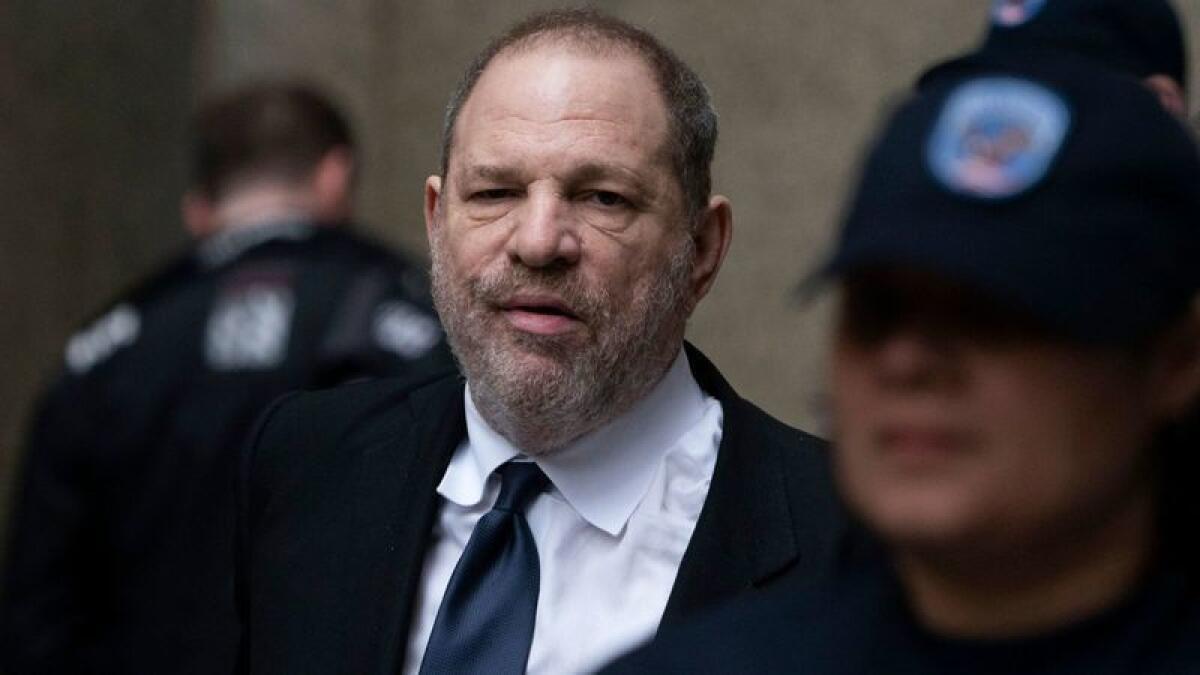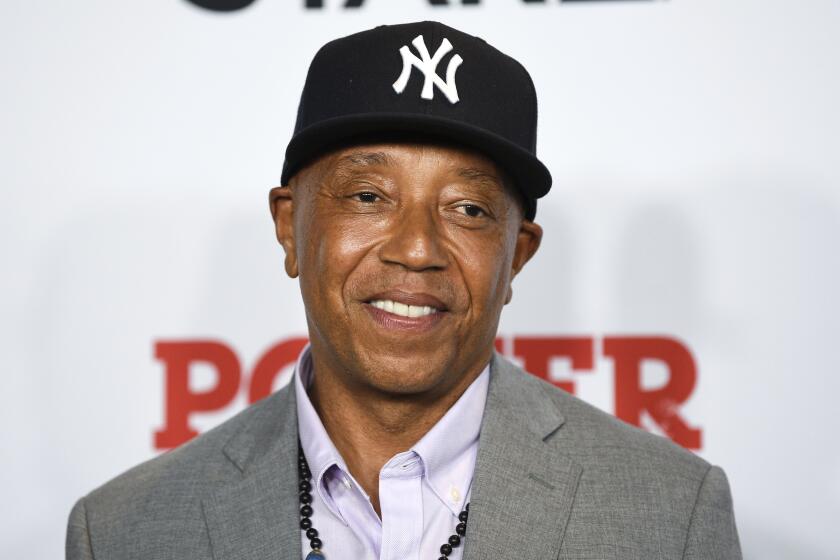Harvey Weinstein’s $44-million settlement with his accusers is in jeopardy

- Share via
Almost as soon as an attorney stood up in a U.S. Bankruptcy Court in Delaware last week and announced that a tentative $44-million deal had been struck between Harvey Weinstein, his former film studio’s board and a number of women who have accused the disgraced movie mogul of sexual misconduct, the squabbling began anew.
Rather than a round of handshakes, various parties to the negotiations circled the wagons. At once, the proposed settlement was denounced as offering inadequate compensation to the victims while enabling Weinstein and the directors of Weinstein Co. to evade accountability or liability. The Hollywood producer behind such Oscar-winning hits as “Shakespeare in Love,” “Chicago” and “The King’s Speech” was fired from his company in October 2017 after dozens of women accused him of sexual misconduct.
For the record:
4:20 p.m. June 3, 2019A previous version of this article misspelled Paz de la Huerta’s surname as De la Heurta.
Attorneys for two of the accusers rejected the proposal outright; while another questioned whether this was an attempt to derail the deal and maximize their clients’ position and grab the lion’s share of compensation. Victims expressed disgust at the entire process; one called it “absolutely re-traumatizing.”
The sniping and brinkmanship being played out in public exposed months of behind-the-scenes infighting as negotiations lurched forward. It also revealed several issues and pressure points that have threatened to torpedo the deal at numerous junctures, raising questions about the difficulties inherent in achieving any kind of meaningful settlement for the victims.
“It’s very difficult, in a very high-profile case involving a very large company with significant assets and liabilities, to have everyone come to an agreement,” said Dmitry Gorin, a former L.A. County deputy district attorney who is a partner at the Los Angeles-based law firm Eisner Gorin. “But that is what bankruptcy court is designed to do. Not everyone is going to be satisfied, but you’re limited by what the assets are.”
At stake is a dwindling pot of money, largely put up by insurance companies, to be divided among a growing number of plaintiffs — and paid to lawyers. Under the proposed terms, $30 million would be allocated to the accusers, unsecured creditors and former Weinstein Co. employees; the remaining $14 million would go to pay legal fees of the studio’s directors and officers. The company filed for bankruptcy in March 2018 and later sold off most of its assets to private equity firm Lantern Capital Partners for $289 million.
Underscoring the challenges, a court hearing scheduled for Tuesday to approve the deal was canceled on Friday, giving the parties more time to hash out their differences, some speculated.
From the start, according to various parties involved, the negotiations have always been fraught and complex. The settlement is contingent upon all of the plaintiffs being in alignment. In this case, there are numerous accusers across multiple jurisdictions, each with their own claims and agendas.
In addition to a class-action suit of alleged victims and former Weinstein Co. employees, there are at least 18 women with individual suits against Weinstein for sexual misconduct, assault or harassment. (Weinstein faces separate criminal charges in New York over multiple accusations of sexual assault.)
The mediator conducted at least 11 sessions, some of which were described as “highly adversarial,” according to court filings during the last year.
While numerous hurdles have threatened to scuttle the deal throughout the process, they have also jeopardized the amount of any potential payout. The current sum on the table is less than half of what was initially proposed when an investor group sought to buy the Weinstein Co. assets last year. That deal, which eventually collapsed, included a victims’ fund of up to $90 million.
Last December the parties agreed to a $60-million deal — $50 million of which would go to the victims, according to an individual familiar with the confidential negotiations. Eighteen women pursuing individual lawsuits would each receive $1 million. Then, Harvey Weinstein’s insurance company refused to contribute 5% to the fund. Some of the attorneys wanted to proceed despite the shortfall, while holdouts refused, and the agreement collapsed.
In April, a judge dismissed the former directors and officers of Weinstein Co. from a federal lawsuit in which several women alleged the directors enabled the producer’s misconduct. The compensation dropped from $1 million to $500,000 since the directors were no longer on the hook to contribute to the victims’ fund.
From the very beginning, I never thought we’d see a penny.
— Zoe Brock, New Zealand-born former model
A continuing point of contention is whether to accept the amount on offer with the individual suits receiving $500,000, and the remainder to be split among the so-called class-action lawsuit applicants. The class payout will be determined based on suffering and severity of the claim. Insurance companies, potentially including Chubb Ltd. and AIG, are expected to make the payment on behalf of Weinstein Co.
But consensus about what path to follow remains elusive.
While some victims are outraged that Weinstein is not personally contributing to the settlement, others say they are willing to sacrifice if it means a settlement for some.
A small number of attorneys, including those with clients whose allegations are the subject of a criminal investigation, said they would seek to pursue Weinstein individually for a settlement or a jury verdict and are waiting for a resolution of criminal proceedings before moving forward.
“It’s problematic the way it’s being approached by people trying to orchestrate a settlement,” said Thomas Peter Giuffra, attorney for Alexandra Canosa, a producer on the Netflix series “Marco Polo,” who alleges that Weinstein raped her.
He finds it particularly distasteful that former board members will have their legal fees reimbursed. “It doesn’t sit well with me.” Singling out Weinstein’s brother Bob, he said, “I’m hard-pressed to think he didn’t know this was going on and to take money out of the pockets of the actual victims is just wrong.”
A representative of Bob Weinstein could not be reached. Harvey Weinstein has denied claims that he engaged in nonconsensual sex. A spokesman for the former mogul declined to comment.
Attorneys Douglas Wigdor and Kevin Mintzer said their client Wedil David, who alleges that Weinstein raped her in a Beverly Hills hotel room in 2015, also rejected the deal. They released a statement calling the process “fundamentally flawed and unfair,” and criticized the terms as “inadequately compensating victims while providing millions of dollars to the ultra-wealthy directors of the Weinstein Company … and their big firm lawyers.”
Aaron Filler, a lawyer representing actress Paz de la Huerta, said he believes the settlement is a fair compromise. “It’s been a long, complex process, and we do feel this settlement provides a measure of justice, though it’s not everything one might hope for,” he said.
A person familiar with the negotiations who was prohibited from discussing them publicly said the agreement could still go forward even if several victims oppose the settlement, though a deal will be harder to reach if enough people oppose it.
While the settlement, no matter how large, will never erase the trauma for some, it is the only means they have to receive a measure of justice.
Zoe Brock, a New Zealand-born former model who was one of the six women who filed a class-action suit against Weinstein and the studio he co-founded in 2017, wants the deal to go through, but she doesn’t think it sends a strong enough signal.
“From the very beginning, I never thought we’d see a penny,” Brock said. “But I still wanted a landmark judgment that would change the world. I did this as a civil rights case to create real change. It’s not the amount of money I might get that I’m complaining about, but I wanted to see an amount that corporations would think twice about before they harbored another Harvey Weinstein or Les Moonves.
“Everyone told us victims that we were changing the world,” she added. Looking back at the last two years, she said that “the system is broken. The process shows that nothing has changed.”
Times staff writers Richard Winton and Ryan Faughnder contributed to this report.
More to Read
Inside the business of entertainment
The Wide Shot brings you news, analysis and insights on everything from streaming wars to production — and what it all means for the future.
You may occasionally receive promotional content from the Los Angeles Times.










